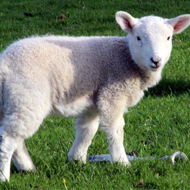
Too much fat will see repeat of 2012's low returns, organisation warns
Sheep farmers are being warned against allowing their lambs to get too fat to ensure they get the best possible returns.
EBLEX, which represents beef and lamb levy payers in England, said it hoped to avoid the situation two years ago, where significant numbers of over-fat lambs came to market.
So far this year, seven per cent fewer lambs have been sold at auction markets around Britain, compared with other years.
The proportion of lambs falling into the two heaviest bands of 45.6 kilo grammes or more, increased by eight per cent, although EBLEX said it should also be noted that conditions last year, meant lambs were particularly slow to finish.
It warned a combination of factors including the availability of ample feed supplies, the expectation of fewer lambs still on farm, and the late Easter, all meant farmers may hang on to their lambs for longer – which in turn could see them put on extra weight and see a repeat of the low prices experienced by the industry two years ago.
Steve Powdrill, EBLEX selection specialist, said: “Heavier lambs are less in demand from processors and often attract a significantly lower price per kilogram, particularly if they are over-fat.
Added to that, the proportion of fat that a lamb puts down increases as the animal ages, and adding fat is more costly than adding lean tissue, therefore producers should not necessarily assume that holding on to lambs will help them get the best returns.
“The key message to producers is to handle lambs regularly, rather than making marketing decisions based purely on weight, and focus on ensuring that lambs meet target specification.
“It’s essential that producers know what the processors require, as such I would advise that they attend one of EBLEX’s live to dead marketing days, available for free through the better returns programme.”
A recent review commissioned by EBLEX looked at how to maximise carcass value and avoid the inefficiencies of too much fat in sheep. The results of this will be issued later this month.
For further information on selecting lambs for slaughter, download the EBLEX BRP manual Marketing Prime Lamb for Better Returns or call 0870 241 8829 or email brp@eblex.ahdb.org.uk to request a hard copy.
Image © Copyright Christine Matthews and licensed for reuse



 HMRC has invited feedback to its communications regarding the employment status of locum vets and vet nurses.
HMRC has invited feedback to its communications regarding the employment status of locum vets and vet nurses.